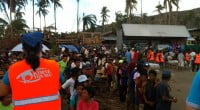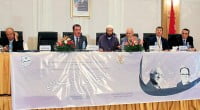What I Saw In Turkey

Date posted: March 30, 2015
CATHERINE AGRO
When I told my family and friends that I would be going on a trip to Istanbul, Turkey, as if it was planned, nearly every one of them asked me to bring them turkey from Turkey, before asking what my mission in Turkey was. Sadly, throughout the five days I spent in the beautiful country which straddles two continents, neither did I see nor taste turkey meat. That is not to say turkey meat isn’t consumed in Turkey but our guide, Cemal Yigit, whose organisation, Inci Production/Ebru Tv Africa facilitated our visit had explained that Turkey is the bastardisation of the original name of the country, Turkiye, by the English in the 14th Century, which had since stuck, and added that turkey meat was however not a constant on the traditional Turkish menu.
If you are reading this and you are one of those I made the promise to, hope this explains why.
Five Nigerian media managers and editors, Femi Adesina, editor-in-chief of The Sun Newspaper and president of Nigeria Guild of Editors, general manager/editor-in-chief of Vanguard Newspaper, Gbenga Adefaye, managing editor of New Telegraph Newspaper, Suleman Uba Gaya, editor of Weekly Trust Newspaper, Abdulkareem Baba Aminu were invited to Turkey by the owners of Inci Production/Ebru Tv Africa. It was to be an educative tour of some Turkish media and Hizmet affiliated organisations. The Hizmet movement, a service organisation (Hizmet is service in Turkish Language) inspired by US-based Turkish Islamic preacher, Fethullah Gulen is active in education with private schools and universities in over 140 countries operated by followers as well as in health care delivery and humanitarian, non-for-profit organisations. Followers of the movement also have substantial investments in the Turkish media and inter-faith dialogue is at the core of what they do. Followers have initiated forums for interfaith dialogue, such as the UFUK Dialogue in Nigeria.
We left Nigeria on Thursday 5th March, from the Nnamdi Azikiwe International Airport, Abuja, aboard a Turkish Airline Airbus 300-200/300. For those who have travelled in this wonder on wings as I love to refer to it, they can relate when I compare the ease with which it slithers through the sky with the passing of a knife through butter. After about seven hours of sleeping and watching movies in the course of the flight, we arrived the following day at about 7:38am.
Like Istanbul, Like Lagos
Istanbul is the largest city in Turkey, the country’s economic, cultural, and historical hub. It was easy to observe the many similarities between Istanbul and Lagos. Like Lagos, it has a population of about 15 million. It is also the commercial capital of Turkey. The traffic situation in Istanbul at peak periods is similar to that of Lagos; the only difference being that in the former, orderly driving prevails and there is respect for pedestrians. Though the Istanbul Gonen Hotel where I was lodged on the ninth floor is only about 15 minutes away from the airport, because we arrived at peak period, we had to contend with a little traffic and then our chauffeur – a pleasant elderly man who even though didn’t understand English Language would always smile at you as a form of greeting – took us to a restaurant where we were treated to traditional Turkish breakfast. The waiters kept on refilling the specially designed tea cups as soon as they noticed that your cup is empty. I learnt later that no meal is complete without the Turkish tea which you are always encouraged to try.
Zaman
Zaman newspaper was the next point of call where we had lunch before an interaction with the general manager, Abdulhamit Bilici. He informed us that the newspaper which was established 30 years ago with a print run of 10,000 copies daily, presently circulates about 1.1 million copies. I’m not sure if the total daily circulation of all major Nigerian newspapers amounts to this. We’ll get there some day. Its main edition is the one published in Turkish but it also publishes its main international edition in Germany where it circulates about one million copies. There are about five million Turks in Germany. It also publishes English editions in the US, UK and other European countries. Zaman is a complete media empire. The size of its headquarters and the many floors of the multi-storey building reserved for expansion attest to this, in addition to the fact that the media outfit also runs Cihan News Agency which was established in 1992 and has reporters in 80 countries and in every province of Turkey, publishes Turkish Review, a magazine established in 1994 which circulates 50,000 copies weekly and a television channel which programmes focus on culture and religious issues as well as other family viewing programmes.
Zaman’s editorial policy is progressive-conservative according to Bilici, and also focuses on supporting human rights, democratic advancement and press freedom, among others. One of its most important priorities is supporting Turkey to become a part of the European Union. Zaman is mostly subscription-based and has a delivery company that circulates the paper.
Unlike Nigeria, newspaper production is relatively less difficult as all materials apart from newsprint and printing machines are imported. The newspaper prints in five regions of the country with its own printing press in all those regions, and circulates double of what all other newspapers circulate in some provinces. The media outfit has about 800 staff working across all its titles and 2000 home delivery staff.
The Turkish media is sharply divided along pro-democracy and pro-statusquo lines and because of its position on some government policies, especially under the current president, Recep Tayyip Erdogan, the media outfit has been having a running battle with the government.
Despite the high sales the paper records, it has not been all rosy. Bilici explained that as a price for its position, government has come down hard on it and encourages the people not to patronise them either by buying the paper or through advertisements, constantly harasses journalists working in the media outfit and imposes heavy taxes on it. Recently, its office was raided and the bureau head was arrested and detained for six days without charges, after which he was released but barred from travelling abroad. The editor-in-chief was also arrested and accused of being the founder of a radical Islamist group. But the government’s actions attracted the sympathy of the public to it. In December 2014 when some its staff were arrested and detained over publications, sales increased by about 80,000 daily.
While noting that the government was pro-democracy until two years ago, Bilici said the government had become highly authoritarian and had created pro-government media which it patronises and encourages the private sector to do same, and advertisers who patronise Zaman usually have tax officers who come down heavily on them to contend with. In a nutshell, as an advertiser, you patronise Zaman at your own peril!
Bilici said almost 70 per cent of the Turkish media is presently under government control and media owners are induced by government to support it.
“We are not given government advertisements, private companies who patronise us are threatened, the tax inspection mechanism is used heavily against us, people are encouraged not to buy us and it is very unfortunate. We supported this government when it was democratic. But unfortunately, it turned against democracy. Ironically, our copy sales went up when they cracked down on us. It shows support from our readers”, he said.
As a means to stay afloat, he said the cover price of the newspaper had to be increased while its editors periodically hold town hall meetings to solicit readers and buyers’ support.
The interaction at Zaman was one of the most rewarding for me. One thing I also took away from Zaman is that despite its challenges, staff remuneration is quite high, compared to Nigerian standards. Minimum wage for an entry level reporter is $800.
From Zaman, we headed for the Mall of Istanbul where we did a little tour and yes- shopping; Nigerians love to shop. Here our guide, Yigit, re-echoed what had been said earlier at Zaman- the economy is going down under President Erdogan. Lira, the local currency is now 2.6 to a dollar. Turks are complaining. Let them come to Nigeria where it was N220 to a dollar at the time of going to press.
Trip To Asia
On Saturday, We left the hotel at about 9am on a trip to the Asian side of Turkey where we visited the Asian headquarters of a Hizmet-affiliated charity organisation, Kimse Yok Mu, meaning ‘Is there anybody out there’? The organisation got its name from the cries of a victim trapped under the rubble in the wake of the Marmara earthquake in 1999, who repeatedly shouted Kimse Yok Mu’while rescue operations were on-going. Founders of the charity were part of the rescue team. Kimse Yok Mu has 40 branches in Turkey and operates in over 100 countries with 200,000 volunteers in Turkey alone. Its humanitarian aids in the areas of food, clothing, healthcare, education, and shelter have provided succour to many people in distress.
Its funding comes from donors. An official told us that the organisation spends about 150 million Turkish Lira, approximately $100million sourced online from its 3.5 million donors every year to assist victims of earthquakes, flood, etc. They take donations from about 5.3 million people online which they use to help people in distress all over the world. In Pakistan, for instance, Kimse Yok Mu has built a town consisting of approximately 300 residences with schools, health centre and other infrastructure for victims of disaster and about 3.5 million people benefit from 1,522 water sources provided by Kimse Yok Mu in different countries. The official said the organisation is driven by collective humanity coming from their religion, Islam.
“Religion drives us. A true Muslim lives a life of service to others at the risk of his life. Any where there is a disaster in the world, we are there in 72 hours”, he added.
Next stop was the Journalists and Writers Foundation. Founded in 1994, the foundation aims to contribute to the society by enriching what already exists. An official, who received us, complained that in Turkey, there is too much power concentrated in the president and that the constitution of the country is constantly violated by the president, giving an example of him running for another term in office while still in office. He also pointed out the frequent attacks on the media saying even social media users are not spared the government’s venom and anything as little as a tweet could land one in jail. He cited the instance of a 13 year-old student that was picked by security agents from his classroom over a facebook post.
Everywhere in Turkey, people are talking about the clampdown on the Turkish media. The situation is quite dire. At Samanyolu, a TV station, has 14 broadcast channels in Turkey, English, Arabic and Kurdish and dozens of radio stations and popular news portals. Foreign news chief, Adnan Tokkapi, said its general manager, Hidayet Karaca, has been held in prison without conviction since December 2014. He recently wrote a letter to the ‘Free World’ from his No 6, Cell Block A5, Silviri Prison where he described himself as a victim of “Witch hunt that has been waged on the free, independent and critical media in Turkey because the increasingly authoritarian government does not like criticism as well as the exposure of major wrongdoings within government agencies”.
Ephesus (Izmir)
On Sunday, we left the hotel early to catch a flight to the Biblical city of Ephesus, now known as Izmir. On arrival at the airport in Izmir, male airport officials handed out roses to female travellers; it was the ‘International Women’s Day’. Yours truly got one too. Sarkan, a young man born and raised in Ephesus was our guide. He met us at the airport and the tour began after a stopover for breakfast. He informed us that only about 18 per cent of the historical city had been excavated and some parts of it restored and that it had since become a tourist destination attracting 40 million tourists annually. During the tour, we saw the reclaimed amphitheatre of Ephesus, temple of Diana, the market, homes and marbled streets among others. The Arcadian Way, which was the major street in Ephesus, was paved with marble slabs which are still evident as well as many other structures built with marble.
Our guide also informed us that early Christian communities lived in Ephesus till the 11th Century when the Muslims came and that the Church of Smyrna, one of the seven churches of Asia written of in the Bible in the book of Revelation, is actually the church at Ephesus. Out of a population of 4.1 million people, only about 3,000 Christians live in the city.
From Ephesus city, we drove through the windy road to Meryem Ana (House of Mother Mary), located on Mt. Koressos, believed to be the place where Mary, the mother of Jesus, spent her last days in a house built for her by John in whose care Jesus left her at his crucifixion. Catholics and Muslims, alike, visit this holy site. Next stop was the Aegean Sea and then we were on our way to the airport for the trip back to Istanbul, but not after we had dinner at a restaurant on the way.
Grand Aquarium and Panorama
By Monday, we had already spent three nights in Istanbul. We started the day with a visit to the Grand Aquarium, one of the biggest in the world. After one hour, we were yet to complete a tour of the aquarium, viewing a wide variety of aquatic creatures including sharks. Next stop was the Panorama, the museum of Turkish history where the entire story of what is now known as Turkey is told in pictures. At the aquarium and Panorama, many Turks, particularly children milled around us and wanted to take pictures of and with us. They found us fascinating. I didn’t see many blacks throughout my stay and the excitement on the children’s faces when they saw us, to me, meant that they don’t see blacks often. Probably, some of them were seeing blacks or so many blacks together for the first time. And that’s how we became celebrities with ‘paparazzi’ running after us.
Even though we had enjoyed Turkey so far, by Tuesday, it was finally the return date and everyone was eager to go back home. But we had a few more places to visit before the trip. The Sultan Ahmed Mosque popularly called Blue Mosque and the Hagia Sophia, which was first a church, then a mosque and now a museum, before the trip to the airport.
And the rest…
During our stay we were hosted to breakfast and dinner by three families. One thing that enthralled me was the way the Turks we visited introduced themselves. Everywhere we went, our hosts after telling us their names and what they do, would go on to say the number of children they have. I also observed that the duty of serving guests in a Turkish home is not only that of the woman, the man and children take active part. Those who hosted us are followers of the Hizmet Movement; they live a life of service. Maybe this explains why the men join their wives to serve guests. And when you leave your shoes by the door while entering a Turks’ apartment, by the time you are leaving, they’ve been cleaned and placed facing outward in the direction you would go.
And lest I forget, there are lots of cats on the streets of Turkey. It was alleged that the Turkish government once blamed power failure in over 30 provinces during the counting of election votes on the cats, saying they must have entered the transformer. Did I hear you say these things happen everywhere? Sure they do!
Source: Leadership Nigeria , March 19, 2015
Tags: Africa | Hizmet (Gulen) movement | Nigeria | Peacebuilding | Turkey |
























